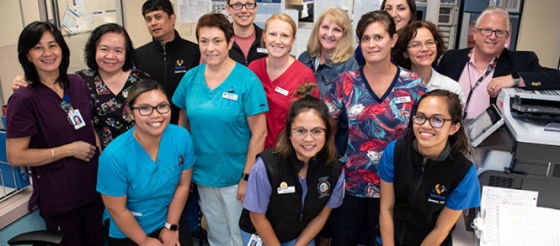An Amazing Race-style competition at Royal Columbian Hospital’s 5 South/5 North wing was the “ultimate communication game” and earned the team an Above and Beyond Innovator Award from Fraser Health.
Chris MacGregor had just begun his job as manager at Royal Columbian Hospital when he participated in a regional care and discharge planning summit. Inspired by the theme of engaging an interprofessional team in care and discharge planning, he returned to 5 South/5 North with the idea of the competitive race.
“I didn’t realize just how engaged they would be. I didn’t expect the competitiveness,” he said. “It was just like the show.”
Inspired by the popular reality series, MacGregor worked with Jen West, a clinical nurse educator, to design different “geographical” routes with clues requiring teamwork that led to a specific goal, with the added challenge of roadblocks and U-turns.
Each of the 12 self-selected teams of six consisted of four nurses, one doctor, plus one more staff member. To spread the game’s lessons with the entire unit, bonus points were awarded for sharing with those who weren’t on one of the teams.
For the first route, which took place in the land of Royal Columbian Hospital, teams worked collaboratively to understand care and discharge planning, leading to the launch of structured interprofessional rounds where nurses now report on their patients daily.
Among other tasks, quality improvement projects, performance planning, and a stairclimbing challenge were incorporated into the game too.
“One team climbed the CN Tower more than 120 times by the end of the race,” MacGregor said.
The other race routes took participants, virtually speaking, to South Korea for the Olympics, then Australia, Brazil, and back home to collect photos of hospital staff with “I am the patient experience” photos.
One of the biggest plot twists was how important culture-building, not just information-sharing, became as the game went on.
“Teams got together at each other’s homes or through social networks to strategize, learn, solve and complete tasks required,” Chris said. “The race itself was complex and kept me sincerely busy, but the outcomes are astounding.”
Some of those outcomes include rolling out a new delirium protocol, code red education, and front-line staff creating processes to self-audit on quality targets.
MacGregor said playing host for this version of The Amazing Race taught him as much as the other participants.
“You can’t do the manager role on your own,” he said. “All the answers are out there on the front-line. If you include and communicate with people, they’ve got great suggestions.”
MacGregor said the game helped him get to know the staff better and involve them in decision-making.
In January, just before the game started, he shifted his workday to start at 6:30 a.m. in order to overlap with the night staff and discuss any issues that arose overnight – a practice he credits with allowing him to help troubleshoot with the team, and staff went home without the burden of those issues weighing on them.
“Everything is communication. And this was the ultimate communication game,” MacGregor said.

